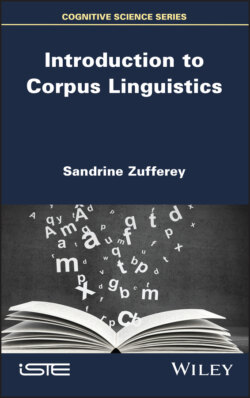Читать книгу Introduction to Corpus Linguistics - Sandrine Zufferey - Страница 9
Оглавление
Preface
Since the 1990s, linguistics has progressively experienced a fundamental methodological turning point. Following the works of American linguist Noam Chomsky, it changed from the essentially rationalist discipline it had been since the middle of the 20th Century, and gradually (re)opened up the empirical approaches represented by corpus linguistics and experimental linguistics. Over the past decade, this transition has accelerated even more, in such a way that the majority of linguistic works published in international journals currently make use of empirical data. Thus, linguistic corpora have gradually established themselves as fundamental tools for linguists, and their use has spread to other fields in linguistics, including those traditionally favoring a rationalist approach, such as syntax. The development of corpus linguistics has led to the creation of new methods for collecting and analyzing linguistic data, which were made possible thanks to the development of computers and the arrival of the Internet. This new direction in linguistics has encouraged spectacular advances for dealing with the multiple facets of human language in all its complexity from a scientific perspective. Our book intends to introduce such a wealth to readers who are not particularly used to reading linguistics-oriented literature.
In our times, the ability to quantitatively analyze corpus data has become an integral part of the linguist’s toolbox. Nevertheless, the use of such data is based on precise theoretical and methodological principles, which require a thorough understanding. This turning point in linguistics implies the need to introduce the new generations of students to the use of these methods which will help them understand the issues underlying their use in scientific literature, to critically assess the results obtained, and to use them in the context of their academic work. Our book is intended as an educational support for students and, in general, for all those wishing to learn the use of corpora in linguistics.
The material introduced in this book does not presuppose prior skills other than basic linguistic knowledge, as well as a minimum command of the most common computer tools, such as spreadsheet software. This book has been designed as study material for teaching corpus linguistics at university initiatory phases, as well as a tool for students wishing to be trained in the use of corpora. Students will be able to work independently thanks the revision questions presented at the end of each chapter, and the detailed answers provided.
As it is an introductory work, this book is necessarily partial and does not deal with all the questions raised by the use of corpora in different linguistic disciplines. It does not cover certain advanced analysis methods which require a high level of computer and statistical skills for data analysis. However, further readings are suggested at the end of each chapter that will enable those who wish to deepen one or other of the aspects presented to go a step beyond.
Finally, this book places a special emphasis on French as an object of study. While it is true that corpus linguistics has imposed itself in an incontestable manner in the English-speaking world and that a significant proportion of French-speaking researchers currently use these methods, the teaching of corpus linguistics still remains marginalized in France. Therefore, this book also aims to highlight the vitality and richness of corpus studies devoted to French, as well as identify the most important resources which have been developed for this language, in the hope of making a contribution to the rise of this discipline for the study of French.
Sandrine ZUFFEREY
June 2020
